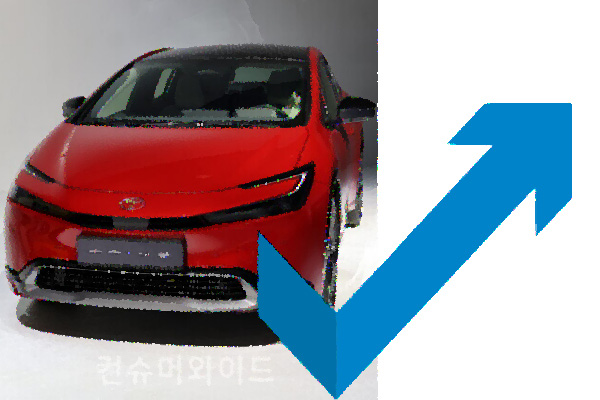
[Consumerwide - HueSoung Jun Reporter / Yohan Bok Reporter] The Japanese vehicle brand trend is clearly returning in Korea, which includes both new and used vehicles, in the midst of favouritism towards hybrid vehicles instead of EVs in the market. The growing trend of Japanese vehicles might maintain for a while.
NO Japan boycott seems over. The sales record of Japanese vehicles is constantly increasing in yes Japan trend.
According to KAMA on February 28, 296,000 overseas brand vehicles were sold in Korea in 2023, which is a 4.8% decrease from a year prior, caused by the popularity of luxury domestic brands and comparison between data points. In particular, the sales records of German and US brands have decreased by each 6.4%, 17.0% whereas the sales records of Japanese brand have increased by 35.5% from a year prior. In the manufacturing location category, the record has increased by 57.6%. It is probably due to the recovery of transactions centered around Toyota and Lexus after the No Japan trend is over in Korea.
Referring to Carisyoudatalab, the Ministry of Land, Transportation, and Infrastructure, and the Korea Automobile Importers and Distributors Association, the market share of Japanese brands in the domestic market takes 8.6% in 2023, which is between the European (85.2%) and the US brand (6.1%). A rapid increase in sales along with Lexus and Toyota might have been the major cause. In imported new vehicle sales rank, Lexus rose to 6th at 13,560 unit due to rapid increase in sales (78.6% (+5967 unit) from a year prior).
The sales record of Toyota has increased by 35.6% (8,500 units) during the same period of time. This is not as dramatic as Lexus in rank, but the sales record was. (+2,230 units). In January, Lexus continued the increasing trend by recording 998 units (ranking 3rd), which is a 73.3% increase from the same month last year (422 units). Toyota has sold 786 units, which is a 195.5% increase from the same season a year prior. (ranking 5th in the imported vehicle competition)
However, not all Japanese vehicle brands are succeeding Korean market regardless of trend. Honda ranked 17th by recording 1,385 last year, which was even less than Polestar, which brand presented only one single model (Polestar 2) for sale. The annual sales record of Polestar was 1,654 rankinig 16th last year, and it seemed slightly recovering in January this year by recording 177 units, which is a 156.5% increase from the same season last year (+108 units).
Japanese brand seem reviving in the used vehicle market.
The second-hand vehicle market seems to reflect the recovery trend of Japanese vehicles recently as No Japan is over.
According to Encardotcom, the transaction of used Japanese vehicles has levelled at 3.14% compared to a year prior, and this is a 77.09% recovery from 2018, before the No Japan Boycott. The trend seems powered by the sales records of Lexus (2.66% increase from a year prior) and Toyota (9.52%). The sales record has reached 97.4% for the year 2018. However, Honda remained, with a slight improvement. The sales record of Honda counts an 8.1% decrease in 2022 and a 3.05% decrease in 2023 from a year prior.
Hybrid vehicles are having a good season, which has resulted in the success of Japanese brands in Korea.
Due to the popularity of hybrids along with the downturn of EVs, Japanese vehicles (both new and used) have been attracting Korean consumers recently. According to KAMA, the sales record of EVs in 2023 approximately stayed at the same level (-1.1%) as a year prior, recording 162,000 units. The EV market is now maturing to popular level. And, customers seem more hesitant to make purchases, demonstrating stagnant flow concerning safety issues (ev fire damage case) and harships during the downturn of the economy.
In constrast, the sales record of hybrid vehicles (FHEV, PHEV, and MHEV) has increased by 42.5% from a year prior, recording 391,000 units. The market share of HVs is 22.3%, up from 16.3%.
They seem to be leading the growth of EV market. Most domestic brands offer hybrid models, but imported brands seem to have only a few options. This could be the reason that consumers are attracted to hybrid models from Lexus and Toyota.
The hybrid trend might continue for a while until EVs enter the hearts of consumers again. Accordingly, the sales growth of Japanese vehicles seem to be continually growing unless another competitive brand appears in the market.
- [Consumption Value-In Depth Report ㉕] Turning off the lights for an hour has the effect of planting 1.13 million trees. Environmental value consumption.
- [Consumption Value: In-Depth Report ㉘] Cultivating forests and planting trees on Arbour Day.
- [Consumption Value: In-Depth Report ㉗] Single-family households are a prospective market for the home appliance and distribution industries in Korea.
- [Consumption Value: In-Depth Report ㉙] Free delivery competition began in full scale among app providers in Korea.

